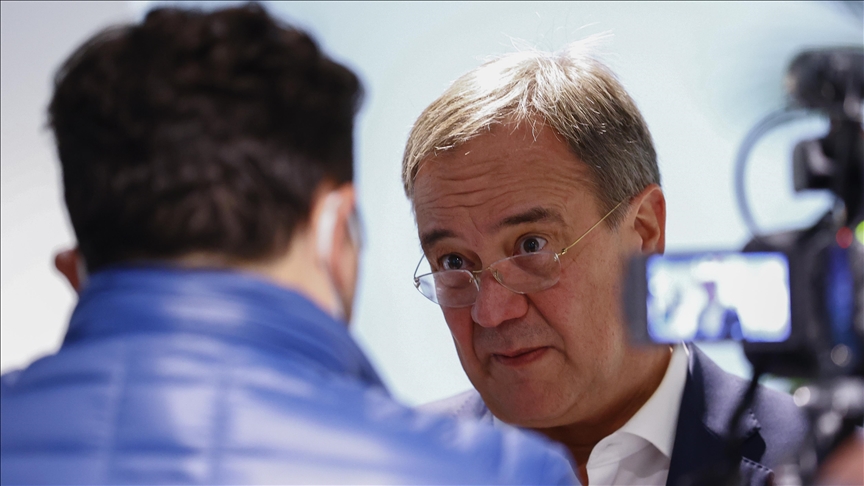‘No contact’: Senior German conservative rules out coalition with far-right AfD
Christian Democratic Union will neither enter coalition talks with the AfD nor form a minority government, ex-chairman Armin Laschet tells Anadolu

- After uproar over cooperation with AfD on anti-immigration bill, Laschet seeks to reassure European partners and Germans that there will be no shift toward far-right politics
- A coalition government would be feasible with either the Social Democrats or the Greens, says ex-CDU leader
BERLIN
Germany’s Christian Democratic Union (CDU) will not cooperate or enter into coalition talks with the far-right Alternative for Germany (AfD) after this month’s elections, according to the party’s former leader Armin Laschet.
In an interview with Anadolu, Laschet, a moderate conservative who served as CDU chairman after ex-German Chancellor Angela Merkel from 2021 to 2022, sought to ease growing concerns about his party’s direction, as speculation mounts about potential cooperation with the AfD after the Feb. 23 polls.
❝We want that everybody, doesn’t matter where his parents or her parents come from, which religion and culture he has, he can have any chance in Germany❞
Armin Laschet, former chairman of the Christian Democratic Union, seeks to ease growing concerns about his party's… pic.twitter.com/PLpGZcjRSP
“There is no contact, no coalition, no cooperation, nothing. CDU leader Friedrich Merz said it at the party convention as well, making it very clear that a coalition with the AfD is not possible,” said Laschet, adding that the distance between CDU and AfD is so significant and deliberate that AfD leaders complain Merz does not even greet them.
Conservative opposition leader Merz, tipped to be the country’s next chancellor, drew sharp criticism last week, including from the co-ruling Social Democrats and Greens, for advancing anti-immigration legislation in parliament with the far-right AfD’s support.
He was accused of abandoning a longstanding principle in German politics against cooperating with right-wing extremists.
Merz’s proposed bill, titled ‘Limiting the illegal influx of third-country nationals into Germany,’ was defeated by a vote of 338 to 350. Its passage would have marked an unprecedented moment in modern German history – the first time a far-right party would have enabled legislation to pass.
The attempt has also sparked concern in European capitals and raised questions about Germany’s political direction after the elections.
Laschet sought to reassure European partners and German citizens that there would be no shift toward far-right politics, noting that the CDU’s proposed migration policies align with measures already in place across other European countries.
“What we proposed has been the practice in France for many years. Denmark, with a social democratic government, changed the policy. Sweden changed the policy,” Laschet said, referring to stricter measures enforced by European governments to curb irregular migration.
“I think a new order in migration policy, differentiating between legal migration and illegal migration, is mainstream in all European states, and we can even come to a European solution,” he added.
The legislative attempt has also raised fears among Germany’s immigrant communities, who make up almost a quarter of the overall population.
Tens of thousands of demonstrators took to the streets across various German cities over the weekend to protest against Merz’s actions and voice opposition to any cooperation with the AfD.
Laschet said the CDU’s proposals aim to curb illegal migration while supporting legal pathways to address the skilled worker shortage. He emphasized that residents and German citizens with migrant backgrounds should not be concerned.
“They are part of our society. We want that everybody, doesn’t matter where his or her parents come from, which religion and culture he or she has, can have any chance in Germany, in the economy, in the politics, wherever. Everybody is needed, everybody is part of society, and this will be the message of the new German government as well,” he said.
Post-election scenarios
The conservative CDU/CSU alliance led by Merz maintains a strong lead in polls, with recent surveys showing the Christian Democrats at 29% compared to the Social Democrats’ (SPD) 18%. Despite this advantage, Merz will need a coalition partner to form a government.
Merz’s main rival, current Chancellor Olaf Scholz, announced last week that he had lost confidence in the CDU leader after his attempt to advance anti-immigration legislation with AfD support.
Laschet criticized Scholz for making false accusations against the CDU, saying the chancellor had failed to effectively address Germany’s major challenges, especially irregular migration.
“I lost trust in Scholz in the last three years. I thought at the beginning he could be a chancellor who brings people together, but he was not even able to do it in his own government. Therefore, a big disappointment about the chancellor,” he said.
Addressing potential post-election scenarios, Laschet made clear that the CDU would neither enter coalition talks with the AfD nor form a minority government.
He emphasized that Germany needs a strong and stable coalition to address major challenges after the elections.
According to current polls, he noted, forming a coalition government would be feasible with either the Social Democrats or the Greens.
“In international affairs, we are closer to the Greens, and in European affairs (as well). In economy and in migration, there’s a gap between CDU and Greens,” he said.
“But politics means to create compromises and to accept that the other had another position than you, and then you find a solution. This is what we can decide after the elections.”
Anadolu Agency website contains only a portion of the news stories offered to subscribers in the AA News Broadcasting System (HAS), and in summarized form. Please contact us for subscription options.







